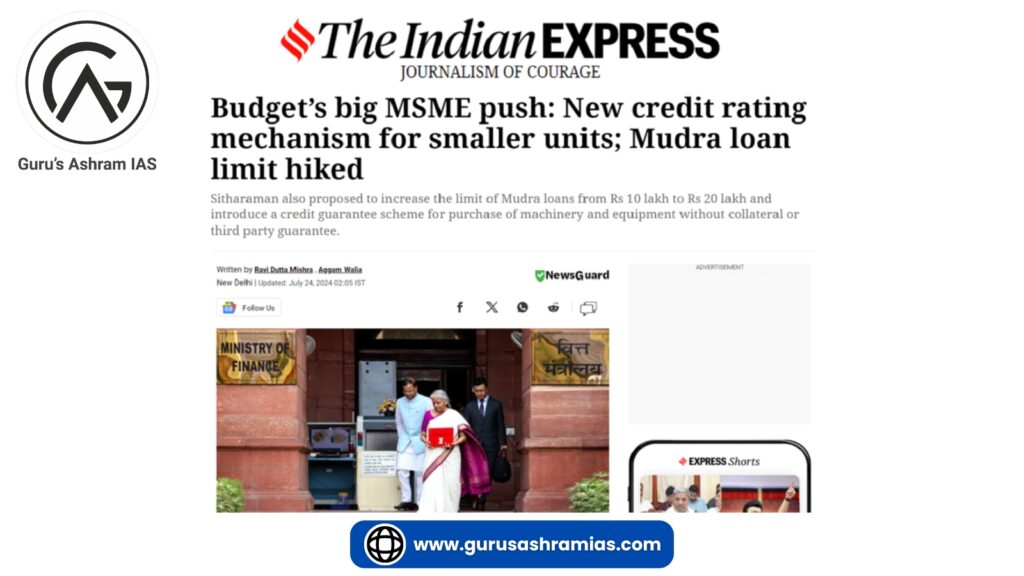MSME Budget 2024
- The Union Budget 2024-25 has made several changes related to the MSME sector, including the application of angel tax, equalization fee on e-commerce, capital gains and securities transaction tax (STT).
Major changes in the Budget with respect to Industry:
Angel Tax:
- The Government has announced the abolition of Angel Tax in the Union Budget 2024-25.
- Angel tax is the tax payable on the amount of money raised by unlisted companies by issuing shares in an off-market transaction, if it exceeds the fair market value of the company.
- Angel tax was introduced in 2012 through the Income Tax Act, 1961, with an aim to control money laundering through investments in startups.
Equalization Fee:
- The government has decided to withdraw the 2% equalisation duty levied on e-commerce supply of goods and services.
- However, for specific digital services like online advertising, 6% equalisation charge under the Finance Act, 2016 shall continue to apply.
- In April 2020, India imposed a 2% equalization fee on revenues generated from e-commerce supplies or services by non-resident e-commerce operators.
- The purpose of the equalisation levy is to tax foreign companies that have a significant local customer base in India but are isolated from the country’s tax system.
- Major American digital companies have been affected by this tariff, due to which Washington has proposed to impose an import duty of up to 25% on many Indian products in response to offset the taxes of about US $55 million.
- In November 2021, India and the US agreed to address tax challenges arising from digitisation of the economy under the OECD / G20 Inclusive Framework Two-Pillar Solution, resulting in suspension of retaliatory tariffs.
Increase in Taxation on Capital Gains and Securities Transaction Tax (STT):
- Budget 2024 has amended the rules for determining long-term capital gains, thereby changing the holding period for various types of capital assets that qualify for short-term or long-term capital gains.
- There will now be only two holding periods: 12 months for short term and 24 months for long term to determine whether the capital gain from the assets is short term or long term.
- However, the proposed holding period (to qualify for long-term capital gains) of all listed assets is 12 months.
- The holding period for including the gains in respect of all other assets as long-term capital gains will be 24 months.
- The exemption limit for capital gains on listed equity and equity-oriented mutual funds has been increased from Rs 1 lakh to Rs 1.25 lakh per annum.
- Short-term capital gains from all assets, except listed equity shares and equity mutual funds, will be taxed as per the tax slab rates of the investor.
- Short-term capital gains tax rate on equity shares and equity mutual funds outside the tax slab has been increased to 20%.
- STT on futures and options (F & O) of securities has been doubled. STT for futures has been increased to 0.02 per cent and for options to 0.1 per cent.
- Options and futures are two types of derivative contracts that derive their value from market activities for the underlying index, security or commodity.
- The option gives the buyer the right, but not the obligation, to buy (or sell) the asset at a specific price at any time during the term of the contract.
- A futures contract obligates the buyer to buy a specific asset and the seller to sell and deliver that asset on a specific future date.
New Assessment Model and Credit Schemes for MSMEs:
New Credit Valuation Model for MSMEs:
- Public sector banks (PSBs) need to assess MSME loan eligibility based on digital footprint rather than traditional criteria such as assets or turnover.
- This will also include MSMEs that do not have a formal accounting system.
Increase in Mudra Credit Limit:
- Mudra loan limit has been increased from Rs 10 lakh to Rs 20 lakh, and entrepreneurs who have successfully repaid previous’ Tarun ‘category loans are eligible for the increased limit.
Mandatory onboarding on TReDS platform:
- The turnover limit for mandatory onboarding on Trade Receivables Discounting System (TReDS) platform has been reduced from Rs 500 crore to Rs 250 crore.
- The move will bring 22 more Central Public Sector Enterprises (CPSEs) and 7,000 additional companies on the platform, increasing access to liquidity and working capital for MSMEs.
Extension of SIDBI branches:
- New branches will be opened by Small Industries Development Bank of India (SIDBI) in major MSME clusters, 24 branches will be added this year, and the target is to cover 168 out of 242 clusters within three years.
Pradhan Mantri Mudra Yojana:
- (PMMY) (launched in 2015) provides collateral-free institutional credit up to Rs 10 lakh for small business enterprises.
- Financing is provided by Scheduled Commercial Banks (SCBs), Regional Rural Banks (RRBs), Non-Banking Financial Companies (NBFCs) and Micro Finance Institutions (MFIs).
There are three loan products under PMMY:
- Shishu (loan up to Rs 50,000)
- Kishor (loan between Rs 50,000 and Rs 5 lakh)
- Tarun (loan between Rs 5 lakh and Rs 10 lakh)
Trade Receivables Discount System (TReDS):
- The Trade Receivables Discount System (TReDS) is an institutional mechanism that facilitates financing of trade receivables of MSMEs through multiple financiers from corporate and other buyers including government departments and Public Sector Undertakings (PSUs).
What are the implications of the recent changes:
Angel Tax:
- The abolition of Angel Tax will strengthen the Indian start-up ecosystem, promote entrepreneurial spirit and foster innovation.
- The abolition of angel tax is expected to attract more foreign investors and provide the necessary capital for start-ups.
- According to Inc42’s Indian Tech Startup Funding Report 2023, start-up funding declined by 60% to US $10 billion in the year 2023.
Equalization Fee:
- The withdrawal of the 2% fee is expected to reduce the compliance burden and create a mutually conducive environment for non-resident digital companies operating in other jurisdictions.
- The move is likely to reduce trade tensions between India and the US, leading to a more collaborative international business environment.
- The decision underlines India’s commitment to align with global taxation norms and practices.
Increase in STT:
- This may lead to decrease in speculative trading, which may lead to decrease in activity in the market.
- The increase in STT is aimed at arresting the rapid growth in volumes in the F & O segment, which has been flagged by the Securities and Exchange Board of
- India (SEBI) and the Reserve Bank of India (RBI) as a potential risk to macroeconomic stability.
- High volumes in derivatives can lead to systemic risk and affect capital formation, investment and economic growth.
- The new tax rates are likely to increase compliance costs for traders and investors, while generating additional revenue for the government.
MSMEs:
- The shift to a digital footprint-based valuation model will facilitate easier access to credit for MSMEs, especially for those who do not have a formal accounting system.
- Increase in Mudra Loan Limit and Guarantees The launch of the Open Credit Guarantee Scheme will boost financial support for MSMEs, enabling them to upgrade technology, invest in new machinery and improve competitiveness.
- Reducing the limit of mandatory onboarding on the TReDS platform will improve liquidity for small enterprises, as it will allow them to convert trade receivables into cash more efficiently.
- Expanding the branches of Small Industries Development Bank of India (SIDBI) will ensure that MSMEs have better access to financial services, thereby facilitating their growth and development.
Conclusion:
- The recent economic reforms outlined in the Union Budget 2024-25 are poised to significantly upgrade India’s financial landscape. These measures demonstrate the commitment to promote a more dynamic and inclusive economy by streamlining credit access for MSMEs, aligning tax policies to global standards and mitigating risks in financial markets.
- Addressing both domestic and international challenges, these reforms aim to create a conducive and more resilient economic environment for sustainable development and innovation.




